-

CS-603 | Computer Network
₹60.00T.Y.B.Sc. | Sem VI | CS-603
COMPUTER SCIENCE
Computer NetworkCOMPUTER NETWORK is a Simplified version for T.Y.B.Sc.
[COMPUTER SCIENCE & INFORMATION TECHNOLOGY] students of our Prashant Publication. This text is in accordance with the new syllabus recommended by the Kavayitri Bahainabai Chaudhari North Maharashtra University, Jalgaon, which has been serving the need of
T.Y. B.Sc. Computer Science students from various colleges. This text is also useful for the student of Engineering, B.Sc. (Information Technology), B.C.A., B.B.M., M.B.M. & other different Computer courses. -

CS-604 | Theoretical Computer Science
₹200.00T.Y.B.Sc. | Sem VI | CS-604
COMPUTER SCIENCE
Theoretical Computer ScienceTHEORETICAL COMPUTER SCIENCE is a Simplified version for T.Y.B.Sc. [COMPUTER SCIENCE & INFORMATION TECHNOLOGY] students of our Prashant Publication. This text is in accordance with the new syllabus recommended by the Kavayitri Bahainabai Chaudhari North Maharashtra University, Jalgaon, which has been serving the need of
T.Y. B.Sc. Computer Science students from various colleges. This text is also useful for the student of Engineering, B.Sc.(Information Technology), B.C.A., B.B.M., M.B.M. & other different Computer courses. -

CS-606 (B) | Java Programming – II
₹90.00T.Y.B.Sc. | Sem VI | CS-606 (B)
COMPUTER SCIENCE
Java Programming – IIJAVA ROGRAMMING – II is a Simplified version for T.Y.B.Sc.
[COMPUTER SCIENCE & INFORMATION TECHNOLOGY] students of our Prashant Publication. This text is in accordance with the new syllabus recommended by the Kavayitri Bahainabai Chaudhari North Maharashtra University, Jalgaon, which has been serving the need of
T.Y. B.Sc. Computer Science students from various colleges. This text is also useful for the student of Engineering, B.Sc.(Information Technology), B.C.A., B.B.M., M.B.M. & other different Computer courses. -

-

-

Dairy Management
₹175.00The authors and publisher of this book have a great pleasure and satisfied to present this book, SEC-102-ZOO : DAIRY MANAGEMENTS (T) Semester I for F.Y.B.Sc. Zoology students. The book has been written as per the new revised syllabus B. Sc. Zoology Major (03 years) / B. Sc. Honours in Zoology (04 years) for the Colleges Affiliated to Savitribai Phule Pune University, Pune to be implemented from June 2024.
The main aim in writing this book is to provide basic information of the subject, to enhance the skill of the students, to cater the needs of the subject as per National Education Policy (NEP), 2020. We tried to explain the concepts and information in a simple lucid language so that students could understand it easily.
We feel that it’s not a new creation but presentation in simple form for the better understanding of students. The figures and photographs included in each chapter will help the students to grasp the subject matter.
We are very grateful to the authors whose reference books and web pages, those are cited at the end of each chapter and at the end of the book, we have referred. -

-

-

-
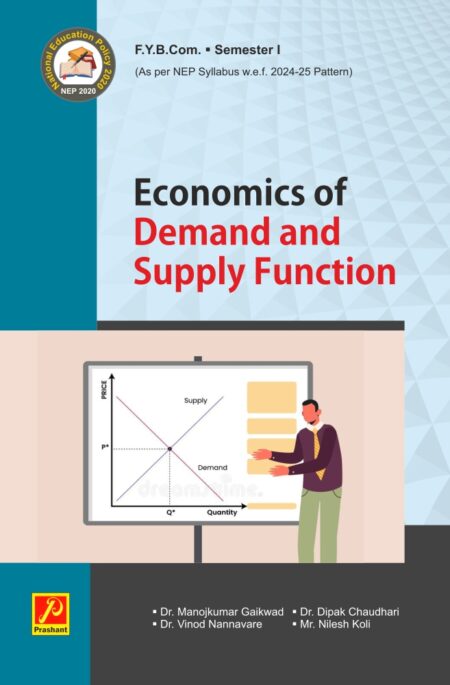
Economics of Demand and Supply Function
₹160.00The book ‘Economics of Demand-Supply Functions’ The first module covers micro-economics, its importance and limitations, concepts related to production, productivity relationships and factors market mechanism/economy. The second module covers demand, theory of demand, individual and market demand curves, elasticity of demand, consumer satisfaction, forecasting of demand. The module third covers equilibrium curve analysis related to consumer behaviour. The module four, covers production function, total, average and marginal product, law of variable quantity and law of quantity product. The fifth module covers factors such as average and marginal costs of production and cost curves, U and L shaped cost curves, internal and external economies and diseconomies. The sixth module covers perfect competition, firms , industries and its short-run and long-run equilibrium. These issues are discussed in depth and comprehensively in this book. This book will definitely be useful for Students, Academicians, Professor, Researchers, Scholars.
-

ELE-101 | Circuit Components and Network Analysis
₹125.00F.Y.B.Sc. | Sem I | ELE-101
ELECTRONICS
Circuit Components and Network AnalysisWe are very glad to present the book ELE– 101 “Circuit Components and Network Analysis’’ in the hands of FYBSc students. The book is strictly written and complied according to the semester pattern syllabus framed by the Board of Studies in Physics, KBC NMU Jalgaon, for First year BSc to be implemented from June 2022 and is written in lucid, simple language giving exhaustive details. Questions of various types are included at the end of each chapter. This will help in generating interest and thorough understanding of the subject. We hope, this book will be useful for the students and teachers.
-

ELE-102 | Basics of Digital Electronics
₹100.00F.Y.B.Sc. | Sem I | ELE-102
ELECTRONICS
Basics of Digital ElectronicsWe are very glad to present the book ELE– 102 “Basics of Digital Electronics’’ in the hands of FYBSc students. The book is strictly written and complied according to the semester pattern syllabus framed by the Board of Studies in Physics, KBC NMU Jalgaon, for First year BSc to be implemented from June 2022 and is written in lucid, simple language giving exhaustive details. Questions of various types are included at the end of each chapter. This will help in generating interest and thorough understanding of the subject. We hope, this book will be useful for the students and teachers.
-

ELE-201 | Analog Electronics
₹85.00F.Y.B.Sc. | Sem II | ELE-201
ELECTRONICS
Analog ElectronicsWe are very glad to present the book ELE– 201 “Analog Electronics’’ in the hands of FYBSc students. The book is strictly written and complied according to the semester pattern syllabus framed by the Board of Studies in Physics, KBC NMU Jalgaon, for First year BSc to be implemented from June 2022 and is written in lucid, simple language giving exhaustive details. Questions of various types are included at the end of each chapter. This will help in generating interest and thorough understanding of the subject. We hope, this book will be useful for the students and teachers.
-

-

ELE-301 | Analog Communication
₹55.00S.Y.B.Sc. | Sem III | ELE-301
ELECTRONICS
Analog CommunicationWe are very glad to present the book “ELE– 301: Analog Communication’’ in the hands of SYBSc students. The book is strictly written and complied according to the semester pattern syllabus framed by the Board of Studies in Electronics, KBC NMU Jalgaon, for Second year BSc to be implemented from June 2019 and is written in lucid, simple language giving exhaustive details. This will help in generating interest and thorough understanding of the subject. We hope, this book will be useful for the students and teachers.
This book is an ideal for any science student or engineering students who wishes to study the subject from its basic principles as well as serving as a guide to more advanced topics for readers of analog circuits and applications. -

ELE-302 | Microprocessors and Applications
₹60.00S.Y.B.Sc. | Sem III | ELE-302
ELECTRONICS
Microprocessors and ApplicationsWhen discrete components and integrated circuits played a vital role in technology development, the advent of microprocessor has changed completely the system design for various real time applications.
A microprocessor is a programmable electronics chip that has computing and decision making capabilities similar to central processing unit of a computer. Any microprocessor based systems having limited number of resources are called microcomputers. Nowadays, microprocessor can be seen in almost all types of electronics devices like mobile phones, printers, automotive electronics, home appliances, electronic toys, and a variety of industrial applications.
This book covers topics ranging from microprocessor (8-bit microprocessors Intel 8085) hardware structures, addressing modes, instruction set, simple programming to the memory and ADC/DAC interfacing. -

ELE-401 | Digital Communication
₹65.00S.Y.B.Sc. | Sem IV | ELE-401
ELECTRONICS
Digital CommunicationWe are very glad to present the book “ELE– 401: Digital Communication’’ in the hands of SYBSc students. The book is strictly written and complied according to the semester pattern syllabus framed by the Board of Studies in Electronics, KBC NMU Jalgaon, for Second year BSc to be implemented from June 2019 and is written in lucid, simple language giving exhaustive details. This will help in generating interest and thorough understanding of the subject. We hope, this book will be useful for the students and teachers.
This book is an ideal for any science student or engineering students who wishes to study the subject from its basic principles as well as serving as a guide to more advanced topics for readers of Digital Communication. -

ELE-402 | Microcontrollers and Applications
₹105.00S.Y.B.Sc. | Sem IV | ELE-402
ELECTRONICS
Microcontrollers and ApplicationsWe are very glad to present the book “ELE– 402: Microcontrollers and Applications’’ in the hands of SYBSc students. The book is strictly written and complied according to the semester pattern syllabus framed by the Board of Studies in Electronics, KBC NMU Jalgaon, for Second year BSc to be implemented from June 2019 and is written in lucid, simple language giving exhaustive details. This will help in generating interest and thorough understanding of the subject. We hope, this book will be useful for the students and teachers.
This book is an ideal for any science student or engineering students who wishes to study the subject from its basic principles as well as serving as a guide to more advanced topics for readers of Microcontrollers and applications. -

-

-

-

English Literature : 18th and 19th Century
₹295.00Contemporary socio-cultural and political forces of life are always strong and they are always reflected in the literature of that time. So, it becomes necessary to take a review of the same. Wordsworth, Coleridge, Shelley, Byron Keats did not come into being overnight. There were strong efforts of their predecessors who were also great literary figures and wanted to change the track of pseudo-classical urban literature. These writers and their efforts cannot be ignored. Of course, Romanticism was a reaction to the earlier poetry and it is notable but it emerged at the end of the 18th century. The Romantic poets and their predecessors fulfilled the needs of the reading public. At the same time, there emerged the need of a new genre like novel for the sake of light reading and entertainment. It was fulfilled by the various contemporary novelists. These poets and novelists paved the path for the forthcoming Victorians.
Surely, Victorians had their own issues and priorities. They did not want to follow the footsteps of Pope, Dr. Johnson or the key Romantic writers. But the germs of Romanticism did not vanish completely in this period also. Every writer is a product of his time. He develops his individual style. And gives his own perspective of life. Tennyson, Browning, Arnold are the all-time masters of letters who have shaped their time and marked prints on time. Their contribution, representative poems and analysis are covered in the present work. -

English Literature 16th and 17th Century
₹295.00English Literature (16th and 17th century) shows the seeds of growth and development of various currents and cross-currents in literature of the time that are in Renaissance or new awakening in pre-Shakespearean period. Shakespeare’s genius is beyond imagination or description. Shakespeare’s The Merchant of The Venice is all time a great work. Introduction, summary, Characterization and comment on major scenes in the play are the various aspects that have been covered in the work.
The 16th and 17th century literature flourished in all directions and in all the popular genres like Drama, poetry, Novel and essays. Donne, Spenser and Sidney are not only the key poets of the time who developed their unique individual style but also they have shaped their age and gave direction to literary masters in the forthcoming ages.
The Dawn of prose writing is evident in the 16th and the 17th Centuries. Novel and Essay are the major forms of literature that are to be understood for the knowledge of later development of these genres. Bunyan’s Pilgrim’s Progress showed the signs of change in the mood of readers and writers and predicted that soon fiction would be a popular form of writing that would be widely and rapidly accepted by the readership. Bunyan’s Pilgrim’s Progress gives us the idea of spiritual mind set of the contemporary society.
-

-
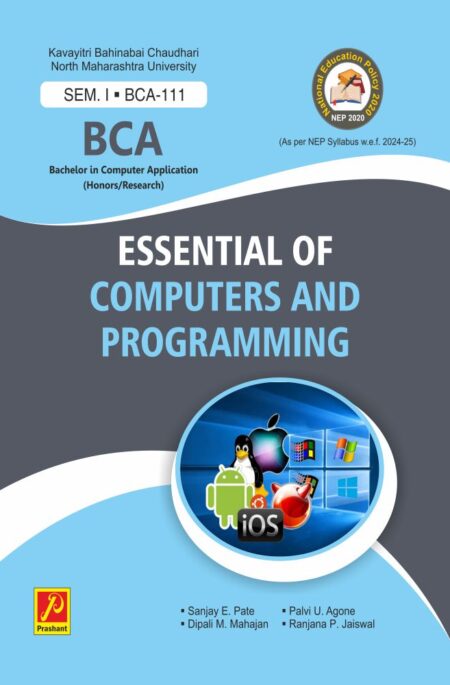
Essential of Computer and Programming
₹80.00Essential of Computer and Programming is a Simple version for F.Y.B.C.A.(NEP) students of our Prashant Publication.
This text is in accordance with the new syllabus NEP-2024 recommended by the Kavayitri Bahainabai Chaudhari North Maharashtra University, Jalgaon, which has been serving the need of F.Y.B.C.A. Computer Science students from various colleges. This text is also useful for the student of Engineering, B.Sc. (Information Technology and Computer Science), M.Sc, M.C.A. B.B.M., M.B.M. other different Computer courses.
We are extremely grateful to Prof. Dr. S.R.Kolhe, Chairman, Board of Studies, and all BOS members of Kavayitri Bahinabai Chaudhari North Maharashtra University, Jalgaon for his valuable guidance.
We are grateful to Prof. Sanjay E. Pate of Nanasaheb Yashwantrao Narayanrao Chavan Arts, Science, and Commerce College, Chalisgaon for coordinating all authors and publication team.
We are obligated to Principals and Librarians and staff of respective colleges for their encouragement. -

-

-

Financial Accounting
₹325.00It is well said that ‘change is the only permanent thing in this world’. Therefore, any change in curriculum of a subject is part of natural process of development. Advancement in knowledge is possible only if a subject is taught and learned differently, at different times. Since Sant Gadgebaba Amravati University is adopting new syllabus for B.Com. (Part – I) Semester I Students of Commerce, it is our duty to present necessary learning material to them.
We have great pleasure in presenting the text book on, ‘Financial Accounting’ for B.Com. (Part -I), Semester I students. It has been written in a teach yourself style, strictly following student friendly approach. Sufficient theory content and numerous examples covering all typical points are given. Illustrations given in the book include the questions set in the University examinations. Topics are arranged exactly according to new syllabus.
We have pleasure to mention that this book would never have been written, without the support and encouragement of family members. Many thanks to them. Special thanks are also due to colleagues in College. Who provided inclusive comments and useful feedback. -
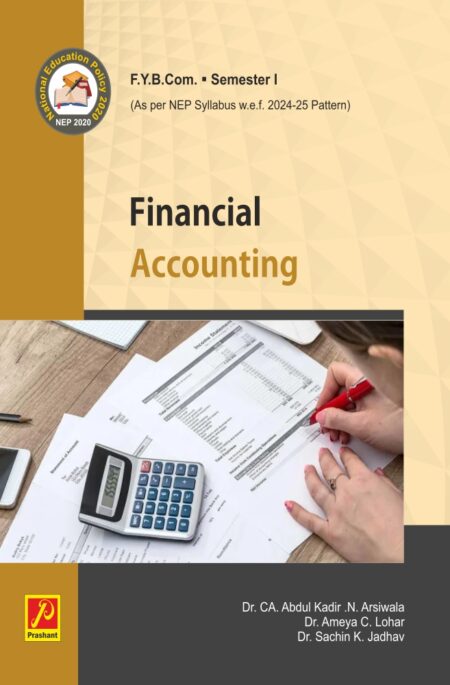
Financial Accounting
₹150.00It is well said that ‘change is the only permanent thing in this world’. Therefore, any change in the curriculum of a subject is part of the natural process of development. Advancement in knowledge is possible only if a subject is taught and learned differently at different times. Since KBC North Maharashtra University is adopting a New Education Policy for First Year Students of Bachelor of Commerce, it is our duty to present the necessary learning material to them.
We are pleased to present the textbook on ‘Financial Accounting’ for F.Y.B.Com. students. It has been written in a teach-yourself style, following a student-friendly approach. Sufficient theory content and numerous examples covering all typical points are given. Illustrations in the book include questions from KBC NMU and other university examinations. Topics are arranged exactly according to the new syllabus.
The syllabus is divided into six units, each designed to provide a thorough understanding of key accounting principles and practices. Unit 1 covers the theoretical framework, including valuation principles, accounting estimates, and the scope of GAAP, Ind AS, and IFRS. Unit 2 focuses on the preparation of financial statements, such as the Trading and Profit & Loss Account, and the Balance Sheet, along with practical numerical problems. Unit 3 deals with the accounts of non-profit organizations, guiding students through the preparation of Receipts and Payment Accounts, Income and Expenditure Accounts, and Balance Sheets. Unit 4 explains the gradual realization and piecemeal distribution of cash on the dissolution of a partnership firm, including methods like the maximum loss method and the highest relative capital method. Unit 5 explores the conversion of a partnership firm into a limited company, detailing the meaning, need for conversion, calculation of purchase consideration, and closing entries. Finally, Unit 6 delves into joint venture accounting, distinguishing between joint ventures and partnerships, and outlining the accounting procedures for joint venture transactions when separate books are maintained. -
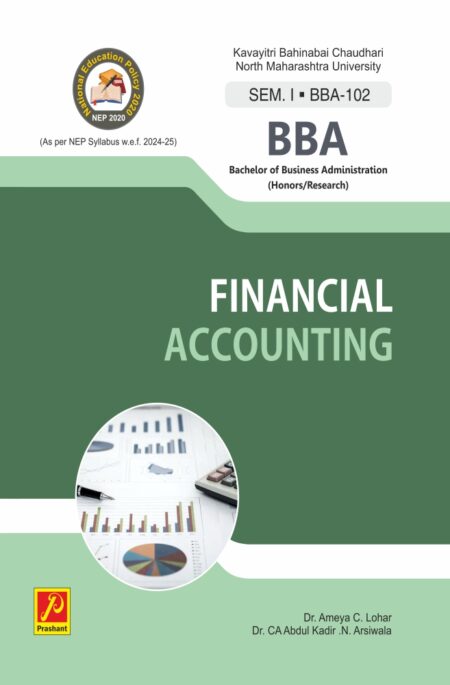
Financial Accounting
₹225.00Financial Accounting is crucial for understanding how businesses manage money by recording, summarizing, and analyzing transactions. It helps businesses track income and expenses, providing insights into profitability and financial health. Key concepts include journals, ledgers, trial balances, and financial statements like profit and loss accounts and balance sheets. This knowledge is valuable for businesses, individuals managing personal finances, and students pursuing careers in commerce, management, and accounting. It ensures transparency and accountability, allowing businesses to communicate with stakeholders such as investors, banks, and the government.
-

Financial Accounting – I
₹280.00First upon we are thankful to all readers of the Financial Accounting-I & II, Corporate Accounting I & II and Advanced Accounting I & II books for countless response. We are privileged to present this book to Commerce students, respectful faculties, and readers as a skill enhancement course. This book is projected for undergraduate-level students, businessmen, and accounting practitioners as per NEP-2020. This book is designed in fulfillment of the revised syllabi of Business Accounting, F.Y.B.Com of Savitribai Phule Pune University 2022 as per National Education policy. This book is also proficient and useful to students and faculties of financial accounting from diverse Universities in India. All chapters are discussed in a detailed, simple, and lucid language which would help students their study advanced accounting in easy manner. Adequate and explicable theory and practical illustrations are given under each topic. Our book aims to assist readers concerning about importance and recent issues of advanced accounting. The book is organized into four chapters viz Amalgamation of Partnership Firms, Sale of a Firm to a Company, Accounting for Leases and Hire Purchase System, and Royalty Accounts. We tried to make this book in such a way that would assist students and readers to understand the basics regarding all the chapters incorporated in it. In addition to this, we comprise a number of variant illustrative solutions using simple and comprehensible methods. This book is the gateway to B.Com. in Accountancy.
Overall, we hope that this book will be beneficial to all readers including students, faculties, professionals, businessmen and accounting practitioners. -

-
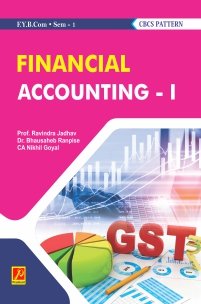
-

-


